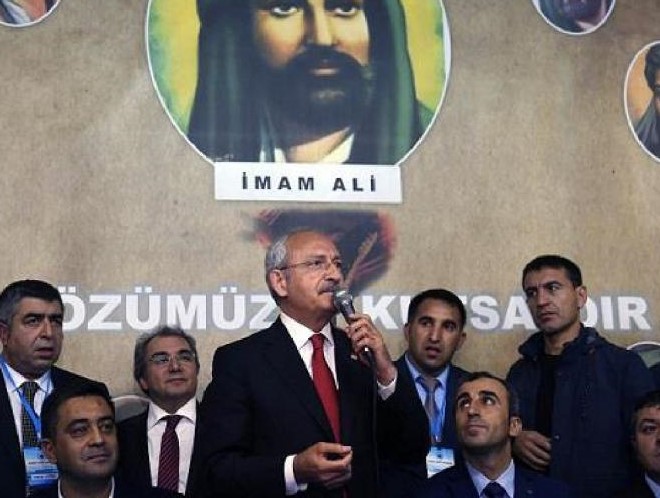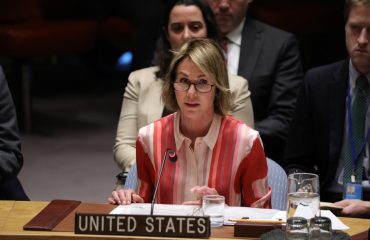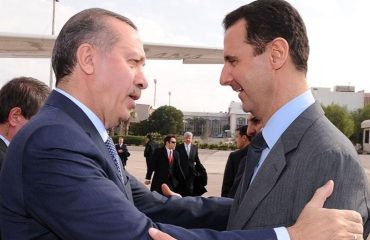

With two videos titled “Alevi” and “Kurds” posted on his official social media account, opposition’s presidential candidate Kemal Kılıçdaroğlu takes taboo-breaking steps against ethnic and religious discrimination rooted in Turkish society and politics. The support is unprecedented.
Türkiye’s main opposition Republican People’s Party (CHP) leader and six-party alliance’s presidential candidate Kemal Kılıçdaroğlu posted a video on his Twitter account with a one-word title: “Alevi”. Within 20 hours, the post had received more than 80 million interactions on the social media platform and had been shared by 64 thousand users. Two days before this video, Kılıçdaroğlu had posted another video titled “Kurds.” He was as if taking slow, taboo-breaking steps, dealing with the two deeply rooted but veiled discriminations in Türkiye.
In the “Kurds” video, the CHP leader said “millions of Kurds are being treated as terrorists and their dignity is being played with.”
He blamed the ruling Justice and Development Party (AKP) for this, which put him there “for the sake of gaining votes.”
“Our people are being alienated from the state,” he said.
In this way, Kılıçdaroğlu was not only standing against those who openly or covertly discriminate against Kurds by saying “every Kurd is a PKK member”. He was also defending his recent contact with the Kurdish-issue-focused People’s Democratic Party (HDP), which was marginalised and criminalised by AKP-MHP alliance propaganda despite being the third largest party group in the parliament.
Kılıçdaroğlu started his “Alevi” video by saying “the time has come,” but its content and target were completely different.
Alevi taboo and discrimination
It should be remembered that when Kılıçdaroğlu’s candidature was first brought up during the formation stages of the six-party opposition alliance, known as the Table of Six, Koray Aydın from the IYI Party raised the first objection by saying that his party would favour “a candidate who might win,” implying that, that candidate would not be him.
Later, IYI Party member İbrahim Halil Oral directly linked the issue to Kılıçdaroğlu’s being an Alevi and apologised right after Meral Akşener’s immediate harsh reaction, but the message was received. Not only that, but there were also objections from within the DEVA Party and the Future Party, although not as openly.
Still, no one can take the torch from President Tayyip Erdoğan’s hands in this regard. Before the 2011 elections, he stressed in his speeches in seven provinces that Kılıçdaroğlu was an Alevi and allowed the crowds to howl at him, increasing the ruling party’s votes in those provinces through “Aleviphobia”. These provinces were Kahramanmaraş, the site of the 1978 massacre of Alevis; Muş, Kastamonu, Amasya, Afyonkarahisar, Denizli, and Malatya. Very skillfully, the hidden Alevi discrimination in society became part of the AKP’s election campaign.
“I am an Alevi and a sincere Muslim”
Heading to the 2023 elections, Erdoğan and AKP members were first pleased that the joint candidate of the opposition was announced as Kılıçdaroğlu, relying on this Aleviphobia that has been rooted in society for hundreds of years.
The Directorate of Religious Affairs does not tolerate any teaching but Hanafi Sunnism and does not consider Alevi belief to be part of Islam.
The President’s attendance at an Alevi fast-breaking ceremony in the holy Muharram month in August 2022 was a matter of dispute because the pictures of Atatürk, Hz. Ali and Hacı Bektaş were removed from the backdrop before Erdoğan’s visit. And when other Cemevis, Alevi places of worship or gathering, refused to do the same for Erdoğan’s sake, the ceremony was cut short.
There were prejudices rooted in centuries.
Therefore, Kılıçdaroğlu’s “Alevi” video, which was released right after Future Party leader Ahmet Davutoğlu’s iftar dinner for ambassadors in Ankara, can be seen as a slow-paced attempt to break taboos.
“I am an Alevi. I am a sincere Muslim raised with the belief in Hak, Muhammad, and Ali,” Kılıçdaroğlu’s video message read. In this context, it is also a response to criticism that he hides his Alevi identity for political reasons.
First support came from Saadet
It is also important that he addressed young voters in particular, saying:
“Our identities are our existence. We are born, grow, and live alongside them. But there are very important things we can choose in life. We can choose to be a good person, to be honest, to be moral, to be conscientious, to be virtuous, and to be fair.”
“We will no longer talk about identities. We will not talk about divisions and differences. We will talk about our commonalities and common dreams. Will you tell this system that says ‘no Alevis’ that the right, honest, and moral ones will be allowed?” he added.
It was also interesting to note that Temel Karamollaoğlu’s Felicity Party was the first to support Kılıçdaroğlu’s Alevi move, which was similar to the headscarf law proposal that prevented Erdoğan from using the issue as election material.
Saadet, the representative of the Islamist view in the Millet Alliance, posted the following message on its Twitter account (quoting Kılıçdaroğlu’s video):
“By choosing good morals, justice, fairness, and sincerity over polarisation, marginalisation, and ‘identity politics’, we can end this distorted order together.”
Babacan, Demirtas, Bahçeli, Soylu
Although it was before Kılıçdaroğlu’s Alevi video, DEVA Party leader Ali Babacan’s message on the same day was also a taboo-breaking move.
“For as long as I can remember,” Babacan began, “in some neighbourhoods it was said, ‘I cannot make myself vote for CHP.’ In this election, in those very neighbourhoods and in many homes, people were saying in a low voice, ‘I cannot make myself vote for the AKP’.”
Selahattin Demirtaş, the jailed former co-chair of the HDP, also congratulated Kılıçdaroğlu on Twitter, saying, “It is possible to live in this land without discrimination, equally, brotherly, and in peace.”
Two politicians reacted to Kılıçdaroğlu before President Erdoğan. First, Interior Minister Süleyman Soylu said, “Why hasn’t he said it until now?” but this was not true. Then MHP leader Devlet Bahçeli condemned Kılıçdaroğlu for seeking identity politics, saying, “Let’s get rid of this.”
Do you know why these reactions should be considered normal?
Because Kılıçdaroğlu has taken an important step to end this discrimination that everyone else pretends does not exist except those who are suffering from it. Discrimination based on belief and ethnicity for political gain must end.
I wonder what else is on Kılıçdaroğlu’s agenda after Kurdish and Alevi discrimination?


